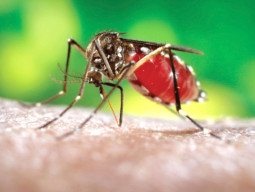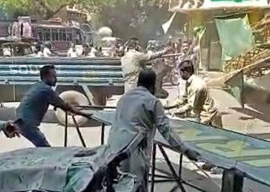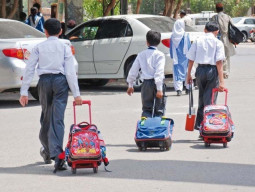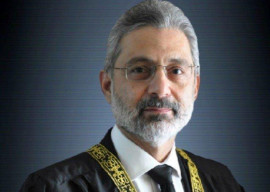
The Constitutional Avenue, where Pakistan Tehreek-e-Insaf and Pakistan Awami Tehreek (PAT) sit-ins are ongoing for the past 20 days has become a no-go-area for health workers as they are scared to work there for the prevention of infections or vector borne diseases.
Health officials, while talking to The Express Tribune, said they are scared to carryout prevention activities or advocacy campaigns in the area even though there is a potential threat of an outbreak of various communicable diseases as they fear they may face resistance from the marchers.
They were of the view that after the recent heavy rainfall in the capital, conditions at the protest site have become worrisome due to the absence of a proper waste disposal system and cleaning system.
“Heaps of paper cups, plates, boxes and eggshells are lying at Constitution Avenue. This provides a favourable breeding ground for the dengue mosquito which so far has affected five people in Rawalpindi,” said Capital Development Authority (CDA) health chief Dr Hassan Urooj.
He said it is not feasible to carry out fumigation or fogging there owing to the large influx of crowds as it may have an adverse effect on the participants’ health and also since they may misconstrue it as a government attempt to spray them with poisonous gas.
Throughout the sit-ins, PAT chief Dr Tahirul Qadri has often accused the government of poisoning the water to harm the protesters.
Urooj said CDA staffers found it difficult to provide clean drinking water to the marchers after the accusations of water poisoning.
“However, we have made health teams that are visiting the area after every three days to keep an eye on the health conditions of the marchers, but they (teams) are facing numerous challenges in carrying out their duties,” he said.
Meanwhile, the authority’s sanitation department has been asked to work at the protest site to improve sanitation conditions, said Urooj.
Talking about the chances of a spread of poliovirus as several children at the sit-in, who have come from the tribal areas and Khyber-Pakhtunkhwa, are unvaccinated, Urooj said so far they have not been tasked to carry out vaccinations against the crippling disease because of fear of resistance from participants. “This sit-in has also delayed anti-polio drives in the capital which were scheduled to be held in the end of August,” he said, adding that an upcoming anti-measles drive may find the same fate.
“I wish these protests wind up soon otherwise they would also affect the anti-measles drive which has been planned on a large scale for the end of this month,” he said.
Talking to The Express Tribune, Shaheed Zulfiqar Ali Bhutto Medical University Vice-Chancellor Prof Javed Akram said they were asked by the Capital Administration and Development Division to make arrangements for vaccinating children against polio at the protest site.
However, Akram said the hospital could not carry out the campaign due to fear of attacks by protesters or other groups. “We are ready to do it if the government provides us full security,” he said.
Akram was of the view that it is not easy to administer polio drops to children as the marchers would think the government has started a campaign in the name of polio drops to damage the health of their kids.
“However, so far, the administration of Pakistan Institute of Medical Sciences has vaccinated 185 children that had come for the sit in and visited the hospital for treatment of minor illnesses,” he informed.
Published in The Express Tribune, September 9th, 2014.


































1714129906-0/Clint-Eastwood-(1)1714129906-0-270x192.webp)






COMMENTS
Comments are moderated and generally will be posted if they are on-topic and not abusive.
For more information, please see our Comments FAQ